User talk:Buster7/Sandbox-English monarchs
Kings and Queens of England (1066-1603)
[edit]| Monarch | Consort | Date of accession | Date of coronation | Presiding cleric |
|---|---|---|---|---|
| William I | [1] | Nov-Dec 1066 | Monday, 25 December 1066 | Ealdred, Archbishop of York |
| [2] | Matilda of Flanders | Sunday, 11 May 1068 | ||
| William II | [3] | 9 September 1087 | Sunday, 26 September 1087 | Lanfranc, Archbishop of Canterbury |
| Henry I | [4] | 2 August 1100 | Sunday, 5 August 1100 | Maurice, Bishop of London |
| [2] | Matilda of Scotland | 11 November 1100 marriage |
Sunday, 11 November 1100 | Anselm, Archbishop of Canterbury |
| [2] | Adeliza of Louvain | 24 January 1121 marriage |
Sunday, 30 January 1121 | Ralph d'Escures, Archbishop of Canterbury |
| Stephen | [1] | Thursday, 26 December 1135 | William de Corbeil, Archbishop of Canterbury | |
| [2] | Matilda of Boulogne | Sunday, 22 March 1136 | ? | |
| Henry II | Eleanor of Aquitaine | 25 October 1154 | Sunday, 19 December 1154 | Theobald of Bec, Archbishop of Canterbury |
| Henry the Young King | [1] | Sunday, 14 June 1170 | Roger de Pont L'Evêque, Archbishop of York | |
| Margaret of France | Sunday, 27 August 1172 at Winchester Cathedral |
Rotrou, Archbishop of Rouen | ||
| Richard I | [4] | 6 July 1189 | Saturday, 2 September 1189 | Baldwin of Exeter, Archbishop of Canterbury |
| [2] | Berengaria of Navarre | 12 May 1191 marriage |
Sunday, 12 May 1191 in Cyprus |
|
| John | [4] | 6 April 1199 | Thursday, 27 May 1199 | Hubert Walter, Archbishop of Canterbury |
| [2] | Isabella of Angoulême | 24 August 1200 marriage |
Sunday, 8 October 1200 | |
| Henry III | [4] | 19 October 1216 | Friday, 28 October 1216 at Gloucester Cathedral |
Cardinal Guala Bicchieri or Peter des Roches, Bishop of Winchester |
| [4] | Sunday, 17 May 1220 | Stephen Langton, Archbishop of Canterbury | ||
| [2] | Eleanor of Provence | 14 January 1236 marriage |
Sunday, 20 January 1236 | Edmund Rich, Archbishop of Canterbury |
| Edward I | Eleanor of Castile | 16 November 1272 | Sunday, 19 August 1274 | Robert Kilwardby, Archbishop of Canterbury |
| Edward II | Isabella of France | 7 July 1307 | Sunday, 25 February 1308 | Henry Woodlock, Bishop of Winchester |
| Edward III | [4] | 20 January 1327 | Sunday, 1 February 1327 | Walter Reynolds, Archbishop of Canterbury |
| [2] | Philippa of Hainault | 24 January 1328 marriage |
Sunday, 18 February 1330 | Simon Mepeham, Archbishop of Canterbury |
| Richard II | [4] | 21 June 1377 | Thursday, 16 July 1377 | Simon Sudbury, Archbishop of Canterbury |
| [2] | Anne of Bohemia | 20 January 1383 marriage |
Thursday, 22 January 1383 | William Courtenay, Archbishop of Canterbury |
| [2] | Isabella of Valois | 1 November 1396 marriage |
Monday, 8 January 1397 | Thomas Arundel, Archbishop of Canterbury |
| Henry IV | [4] | 30 September 1399 | Monday, 13 October 1399 | |
| [2] | Joanna of Navarre | 7 February 1403 marriage |
Monday, 26 February 1403 | |
| Henry V | [4] | 20 March 1413 | Sunday, 9 April 1413 | |
| [2] | Catherine of Valois | 2 June 1420 marriage |
Sunday, 23 February 1421 | Henry Chichele, Archbishop of Canterbury |
| Henry VI | [4] | 31 August 1422 | Sunday, 6 November 1429 | |
| [4] | 21 October 1422 | Sunday, 16 December 1431 as King of France at Notre Dame de Paris |
Henry Beaufort, Bishop of Winchester | |
| [2] | Margaret of Anjou | 23 April 1445 marriage |
Sunday, 30 May 1445 | John Stafford, Archbishop of Canterbury |
| Edward IV | [4] | 4 March 1461 | Sunday, 28 June 1461 | Thomas Bourchier, Archbishop of Canterbury |
| [2] | Elizabeth Woodville | 1 May 1464 marriage |
Sunday, 26 May 1465 | |
| Richard III | Anne Neville | 25 June 1483 | Sunday, 6 July 1483 | |
| Henry VII | [4] | 22 August 1485 | Sunday, 30 October 1485 | |
| [2] | Elizabeth of York | 18 January 1486 | Sunday, 25 November 1487 | John Morton, Archbishop of Canterbury |
| Henry VIII | Catherine of Aragon | 21 April 1509 (King) 11 June 1509 (Queen) marriage |
Sunday, 24 June 1509 | William Warham, Archbishop of Canterbury |
| [2] | Anne Boleyn | 28 May 1533 marriage |
Sunday, 1 June 1533 | Thomas Cranmer, Archbishop of Canterbury |
| Edward VI | [3] | 28 January 1547 | Sunday, 20 February 1547 | |
| Mary I | [4] | 19 July 1553 | Sunday, 1 October 1553 | Stephen Gardiner, Bishop of Winchester |
| Elizabeth I | [3] | 17 November 1558 | Sunday, 15 January 1559 | Owen Oglethorpe, Bishop of Carlisle |
House of Plantagenet
[edit]Stephen came to an agreement with Matilda in November 1153 with the signing of the Treaty of Wallingford, where Stephen recognised Henry, son of Matilda, as his heir to the throne in lieu of his own son.
Rather than ruling among the Normans, the Plantagenets ruled from Aquitaine — lands which were acquired through Henry II's marriage to Eleanor of Aquitaine, but did not regard England as their primary home until after most of their French possessions were lost by King John. This long-lived dynasty is usually divided into three houses: the Angevins, the House of Lancaster and the House of York.
The Plantagenets formulated England's royal coat of arms, which usually showed other kingdoms held or claimed by them or their successors, although without representation of Ireland for quite some time.
| Name | Portrait | Birth | Marriages | Death | Claim |
|---|---|---|---|---|---|
| Henry II Henry Curtmantle (Henri Court-manteau) 19 December 1154–1189[5] |
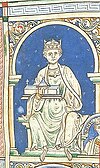 |
5 March 1133 Le Mans son of Geoffrey of Anjou and Matilda[5] |
Eleanor of Aquitaine Bordeaux Cathedral 18 May 1152 eight children[5] |
6 July 1189 Chinon aged 56.[5] Buried at Fontevraud Abbey |
grandson of Henry I (Treaty of Wallingford) |
| Henry the Young King (Henri le Jeune Roy) (co-ruler with his father) 14 June 1170–1183 |
 |
28 February 1155
son of Henry II and Eleanor of Aquitaine |
Margaret of France Winchester Cathedral 27 August 1172 one child |
11 June 1183 Martel, Limoges aged 28. Buried at Rouen Cathedral (Notre-Dame) |
son of Henry II (coronation as junior king) |
| Richard I Richard the Lionheart (Richard Cœur de Lion) 3 September 1189–1199[5] |
 |
8 September 1157 Beaumont Palace son of Henry II and Eleanor of Aquitaine[5] |
Berengaria of Navarre Limassol 12 May 1191 no children[5] |
6 April 1199 Chalus aged 41 from an arrow wound in the shoulder that became infected.[5] Buried: Heart at Rouen Cathedral. Body at Fontevraud Abbey |
son of Henry II (primogeniture) |
| John Lackland (Jean sans Terre) 27 May 1199–1216[6] |
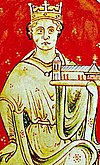 |
24 December 1166 Beaumont Palace son of Henry II and Eleanor of Aquitaine[6] |
(1) Isabel of Gloucester Marlborough Castle 29 August 1189 no children (2) Isabella of Angoulême |
19 October 1216 Newark-on-Trent aged 49, probably from dysentery brought on by eating peaches and drinking wine.[6] Buried at Worcester Cathedral |
brother of Richard I (appointment) |
Disputed claimant
Louis VIII of France briefly ruled about half of England from 1216 to 1217 at the conclusion of the First Barons' War against King John. On marching into London he was openly received by the rebel barons and citizens of London and proclaimed (though not crowned) king at St Paul's cathedral. Many nobles, including Alexander II of Scotland for his English possessions, gathered to give homage to him. However in signing the Treaty of Lambeth in 1217 Louis conceded that he had never been the legitimate king of England.
| Name | Portrait | Birth | Marriages | Death | Claim |
|---|---|---|---|---|---|
| Louis The Lion 1216–22 September 1217 Title disputed |
 |
5 September 1187 Paris son of Philip II of France, and Isabella of Hainault |
Blanche of Castile Portmont 23 May 1200 13 children |
8 November 1226 Montpensier aged 39 |
Right of conquest |
| Name | Portrait | Birth | Marriages | Death | Claim |
|---|---|---|---|---|---|
| Henry III Henry of Winchester 28 October 1216–1272[7] |
 |
1 October 1207 Winchester Castle son of John and Isabella of Angoulême[7] |
Eleanor of Provence Canterbury Cathedral 14 January 1236 nine children[7] |
16 November 1272 Westminster Palace aged 65[7] |
son of John (primogeniture) |
| Edward I Longshanks 20 November 1272–1307[8] |
 |
17 June 1239 Westminster Palace son of Henry III and Eleanor of Provence[8] |
(1) Eleanor of Castile Abbey of Santa Maria la Real de Huelgas 18 October 1254 17 children (2) Margaret of France |
7 July 1307 Burgh by Sands aged 68[8] |
son of Henry III (primogeniture) |
| Edward II 7 July 1307 – 25 January 1327[9] |
 |
25 April 1284 Caernarfon Castle son of Edward I and Eleanor of Castile[9] |
Isabella of France Boulogne Cathedral 25 January 1308 five children[9] |
21 September 1327 Berkeley Castle aged 43 (murdered, probably 'with a hoote brooche putte thro the secret place posterialle' according to a Confessor of one of the Jailers)[9][10] |
son of Edward I (primogeniture) |
| Edward III 25 January 1327–1377[11] |
 |
13 November 1312 Windsor Castle son of Edward II and Isabella of France[11] |
Philippa of Hainault York Minster 24 January 1328 14 children[11] |
21 June 1377 Sheen Palace aged 64[11] |
son of Edward II (primogeniture) |
| Richard II 21 June 1377 – 29 September 1399[12] |
 |
6 January 1367 Bordeaux son of Edward, the Black Prince and Joan of Kent[12] |
(1) Anne of Bohemia 14 January 1382 no children (2) Isabella of Valois |
14 February 1400 Pontefract Castle aged 33 probably from starvation[12] |
grandson of Edward III (primogeniture) |
House of Lancaster
[edit]This house descended from Edward III's third surviving son, John of Gaunt.
| Name | Portrait | Birth | Marriages | Death | Claim |
|---|---|---|---|---|---|
| Henry IV Bolingbroke 30 September 1399–1413[13] |
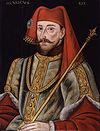 |
3 April 1366/7 Bolingbroke Castle son of John of Gaunt and Blanche of Lancaster[13] |
(1) Mary de Bohun Arundel Castle 27 July 1380 seven children (2) Joanna of Navarre |
20 March 1413 Westminster Abbey aged 45 or 46[14] |
grandson and heir male of Edward III (usurpation/agnatic primogeniture) |
| Henry V 20 March 1413–1422[13] |
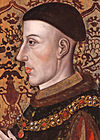 |
16 September 1386 or 9 August 1387[15] Monmouth Castle son of Henry IV and Mary de Bohun[13] |
Catherine of Valois Troyes Cathedral 2 June 1420 one son[13] |
31 August 1422 Château de Vincennes aged 35[13] |
son of Henry IV (agnatic primogeniture) |
| Henry VI (first reign) 31 August 1422 – 4 March 1461[16] |

|
6 December 1421 Windsor Castle son of Henry V and Catherine of Valois[16] |
Margaret of Anjou Titchfield Abbey 22 April 1445 1 son[16] |
21 May 1471 Tower of London aged 49[16] |
son of Henry V (agnatic primogeniture) |
House of York
[edit]The House of York was descended from the fourth surviving son of Edward III, Edmund of Langley, 1st Duke of York.
The Wars of the Roses (1455–1485) saw the throne pass back and forth between the rival houses of Lancaster and York.
| Name | Portrait | Birth | Marriages | Death | Claim |
|---|---|---|---|---|---|
| Edward IV (first reign) 4 March 1461 – 2 October 1470[17] |

|
28 April 1442 Rouen son of Richard Plantagenet, 3rd Duke of York, and Cecily Neville[17] |
Elizabeth Woodville Grafton Regis 1 May 1464 ten children[17] |
9 April 1483 Westminster Palace aged 40[17] (probably died of a stroke after catching a chill during a fishing trip) |
great-great-grandson and heir general of Edward III (seizure of the crown/cognatic primogeniture) |
House of Lancaster (restored)
[edit]| Name | Portrait | Birth | Marriages | Death | Claim |
|---|---|---|---|---|---|
| Henry VI (second reign) 30 October 1470 – 11 April 1471[16] |

|
6 December 1421 Windsor Castle son of Henry V and Catherine of Valois[16] |
Margaret of Anjou Titchfield Abbey 22 April 1445 1 son[16] |
21 May 1471 Tower of London aged 49 (murdered)[16] by being stabbed in the head. |
son of Henry V (seizure of the crown) |
House of York (restored)
[edit]| Name | Portrait | Birth | Marriages | Death | Claim |
|---|---|---|---|---|---|
| Edward IV (second reign) 11 April 1471 – 9 April 1483[17] |

|
28 April 1442 Rouen son of Richard Plantagenet, 3rd Duke of York, and Cecily Neville[17] |
Elizabeth Woodville Grafton Regis 1 May 1464 ten children[17] |
9 April 1483 Westminster Palace aged 40[17] (probably died of a stroke after catching a chill during a fishing trip) |
great-great-grandson and heir general of Edward III (seizure of the crown/cognatic primogeniture) |
| Edward V 9 April – 25 June 1483[18] |
 |
2 November 1470 Westminster son of Edward IV and Elizabeth Woodville[18] |
unmarried | c. 1483 London aged about 12[19] (according to many sources smothered) |
son of Edward IV (cognatic primogeniture) |
| Richard III 26 June 1483–1485[20] |
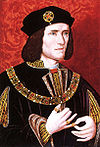 |
2 October 1452 Fotheringhay Castle son of Richard Plantagenet, 3rd Duke of York, and Cecily Neville[21] |
Anne Neville Westminster Abbey 12 July 1472 1 son[21] |
22 August 1485 Bosworth Field aged 32 (killed in battle)[21] |
great-great-grandson of Edward III (Titulus Regius) |
Kings and Queens of England, Ireland and Scotland[22] (1603-1707), of Great Britain and Ireland (1707-1801) and the United Kingdom (1801-Present)
[edit]| Monarch | Consort | Date of accession | Time intervening | Date of coronation | Presiding cleric |
|---|---|---|---|---|---|
| James I and VI | Anne of Denmark | 24 March 1602/1603, O.S.[23] | 4 mo 1 d | Monday, 25 July 1603, O.S. | John Whitgift, Archbishop of Canterbury |
| Charles I | [24] | 27 March 1625, O.S. | 10 mo 6 d | Thursday, 2 February 1625/1626, O.S.[23] | George Abbot, Archbishop of Canterbury |
| Charles II | [4] | 30 January 1648/1649, O.S.[23] (de jure) 8 May 1660, O.S. (de facto) |
11 mo 15 d | Tuesday, 23 April 1661, O.S. | William Juxon, Archbishop of Canterbury |
| James II and VII | Mary of Modena | 6 February 1684/1685, O.S.[23] | 2 mo 17 d | Thursday, 23 April 1685, O.S. | William Sancroft, Archbishop of Canterbury |
| William III and Mary II | (reigned jointly) | 13 February 1688/1689, O.S.[23] | 1 mo 29 d | Thursday, 11 April 1689, O.S. | Henry Compton, Bishop of London |
| Anne | [25] | 8 March 1701/1702, O.S.[23] | 1 mo 15 d | Thursday, 23 April 1702, O.S. | Thomas Tenison, Archbishop of Canterbury |
| George I | [26] | 1 August 1714, O.S. | 2 mo 19 d | Wednesday, 20 October 1714, O.S. | |
| George II | Caroline of Ansbach | 11 June 1727, O.S. | 4 mo | Wednesday, 11 October 1727, O.S. | William Wake, Archbishop of Canterbury |
| George III | Charlotte of Mecklenburg-Strelitz | 25 October 1760 (King) 8 September 1761 (Queen) |
10 mo 28 d 14 d |
Tuesday, 22 September 1761 | Thomas Secker, Archbishop of Canterbury |
| George IV | [27] | 29 January 1820 | 1 y 5 mo 20 d | Thursday, 19 July 1821 | Charles Manners-Sutton, Archbishop of Canterbury |
| William IV | Adelaide of Saxe-Meiningen | 26 June 1830 | 1 y 2 mo 13 d | Thursday, 8 September 1831 | William Howley, Archbishop of Canterbury |
| Victoria | [4][25] | 20 June 1837 | 1 y 8 d | Thursday, 28 June 1838 | |
| Edward VII | Alexandra of Denmark | 22 January 1901 | 1 y 6 mo 18 d | Saturday, 9 August 1902[28] | Frederick Temple, Archbishop of Canterbury |
| George V | Mary of Teck | 6 May 1910 | 1 y 1 mo 16 d | Thursday, 22 June 1911 | Randall Davidson, Archbishop of Canterbury |
| 1 y 7 mo 6 d | Tuesday, 12 December 1911 as Emperor of India at the Delhi Durbar |
None | |||
| George VI | Elizabeth Bowes-Lyon | 11 December 1936 | 5 mo 1 d | Wednesday, 12 May 1937[29] | Cosmo Lang, Archbishop of Canterbury |
| Elizabeth II | [25] | 6 February 1952 | 1 y 3 mo 27 d | Tuesday, 2 June 1953 | Geoffrey Fisher, Archbishop of Canterbury |
References
[edit]- ^ a b c Married, but not jointly crowned
- ^ a b c d e f g h i j k l m n o p Separate coronation of queen consort
- ^ a b c never married
- ^ a b c d e f g h i j k l m n o p Unmarried at time of coronation
- ^ a b c d e f g h "thePeerage.com – Person Page 10202". Retrieved 25 October 2007.
- ^ a b c d "thePeerage.com – Person Page 10201". Retrieved 25 October 2007.
- ^ a b c d "thePeerage.com – Person Page 10193". Retrieved 25 October 2007.
- ^ a b c d "thePeerage.com – Person Page 10191". Retrieved 25 October 2007.
- ^ a b c d Edward II was officially deposed by Parliament on 25 January 1327, having been imprisoned on 16 November 1326. "thePeerage.com – Person Page 10094". Retrieved 25 October 2007.
- ^ The date of Edward II's death is disputed by Ian Mortimer in his book "The Perfect King: The Life of Edward III, Father of the English Nation," which argues that he may not have been murdered, but held imprisoned in Europe for several more years: ISBN 009952709X
- ^ a b c d "thePeerage.com – Person Page 10188". Retrieved 25 October 2007.
- ^ a b c d Richard II was deposed, and became a prisoner of Henry Bolingbroke, who usurped the throne from the prior claims of the issue of his father John of Gaunt. "thePeerage.com – Person Page 10206". Retrieved 25 October 2007.
- ^ a b c d e f g "thePeerage.com – Person Page 10187". Retrieved 25 October 2007.
- ^ "HENRY IV - Archontology.org". Retrieved 25 October 2007.
- ^ Biography of HENRY V - Archontology.org. Retrieved 28-11-2009
- ^ a b c d e f g h Edward IV usurped the throne in 1461 after years of civil war. Henry VI was restored for about five months in 1470 before being deposed again permanently. "thePeerage.com – Person Page 10186". Retrieved 25 October 2007.
- ^ a b c d e f g h Edward was briefly deposed during his reign by Henry VI. "thePeerage.com – Person Page 10164". Retrieved 25 October 2007.
- ^ a b Edward V was deposed by Richard III, who usurped the throne on the grounds that Edward was illegitimate. "EDWARD V - Archontology.org". Retrieved 25 October 2007.
- ^ "thePeerage.com – Person Page 10165". Retrieved 25 October 2007.
- ^ "RICHARD III - Archontology.org". Retrieved 25 October 2007.
- ^ a b c "thePeerage.com – Person Page 10163". Retrieved 25 October 2007.
- ^ From 1603 on England, Ireland and Scotland were personally united under the same ruler, see Personal union.
- ^ a b c d e f In England at this time, the new year began on 25 March. Dates between 1 January and 25 March are accordingly given a double year, the first by the old mode of reckoning, the second by the current mode.
- ^ Spouse Henrietta Maria, as a Catholic did not participate in the Anglican coronation ceremony
- ^ a b c Consorts of British Queens regnant are not crowned.
- ^ Spouse Sophia Dorothea of Celle divorced 1694
- ^ Caroline of Brunswick turned away from coronation by force
- ^ Originally scheduled for 26 June 1902, but postponed due to the King's life-threatening illness.
- ^ Date originally planned for coronation of Edward VIII
